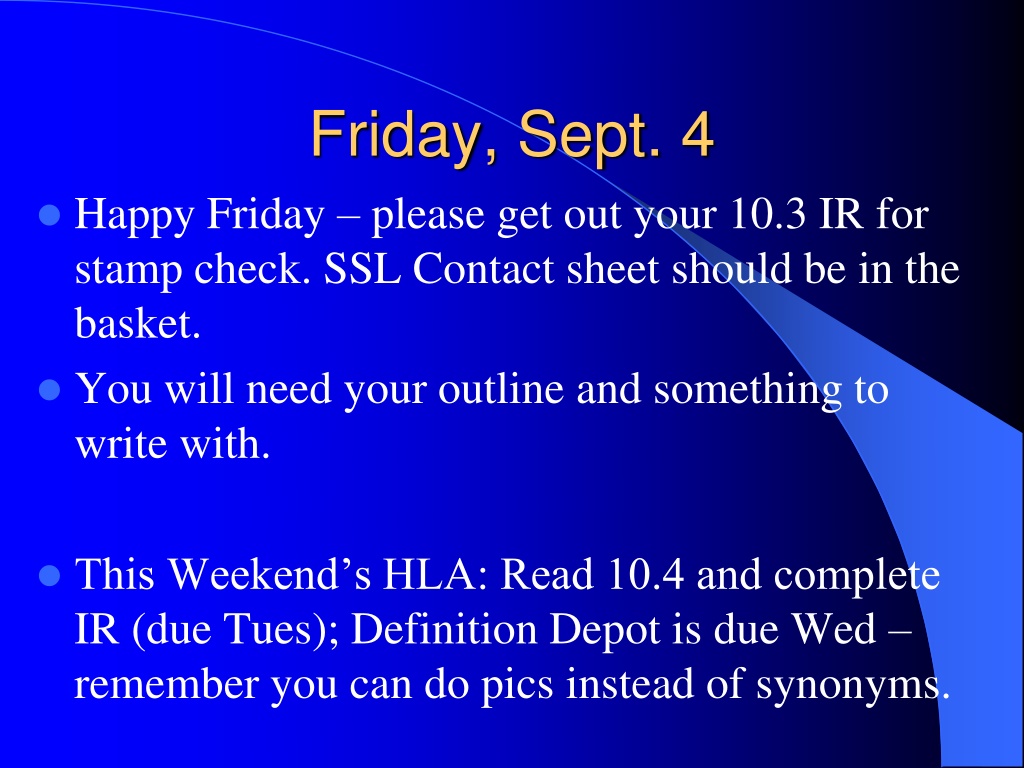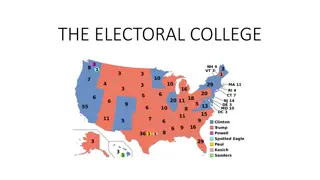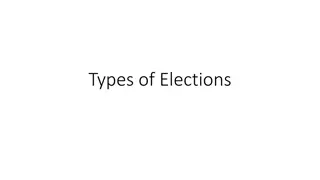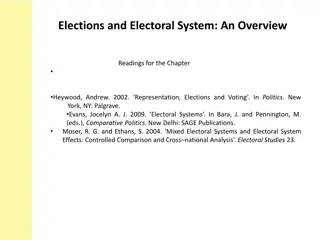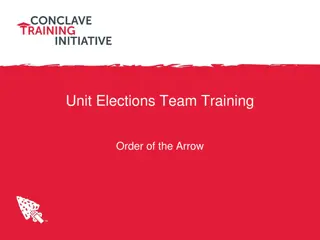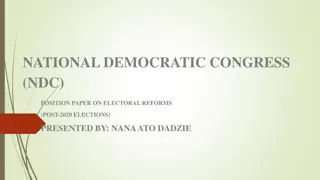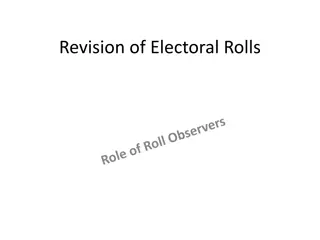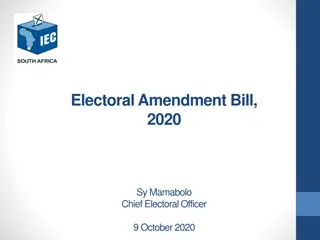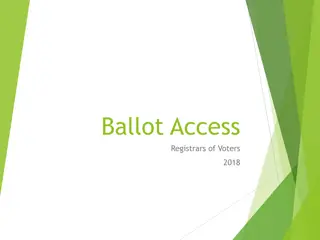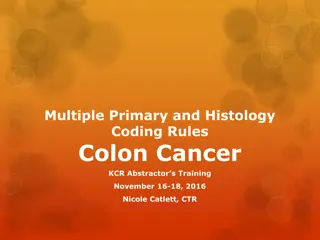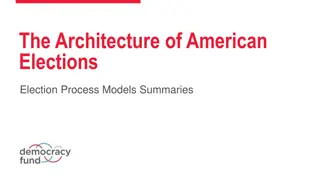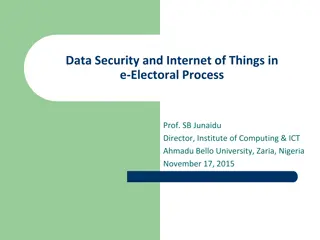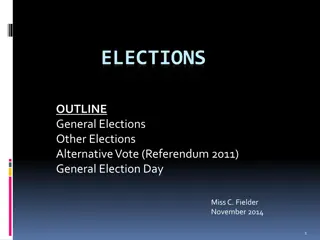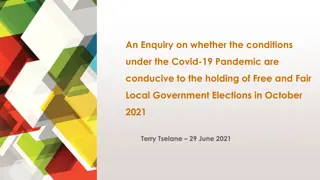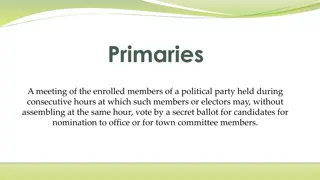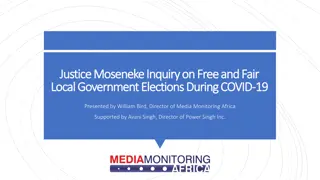Understanding the Electoral Process: Primaries, Elections, and the Electoral College
Learn about the different levels of elections, including primary and general elections, and how the Electoral College functions in the U.S. political system. Understand the nomination process and the significance of voter participation in choosing political leaders. Explore the roles of federal, state, and local governments in overseeing the electoral process. Discover the history behind the selection of presidential candidates and the importance of engaging in the democratic process.
Download Presentation

Please find below an Image/Link to download the presentation.
The content on the website is provided AS IS for your information and personal use only. It may not be sold, licensed, or shared on other websites without obtaining consent from the author. Download presentation by click this link. If you encounter any issues during the download, it is possible that the publisher has removed the file from their server.
E N D
Presentation Transcript
Friday, Sept. 4 Happy Friday please get out your 10.3 IR for stamp check. SSL Contact sheet should be in the basket. You will need your outline and something to write with. This Weekend s HLA: Read 10.4 and complete IR (due Tues); Definition Depot is due Wed remember you can do pics instead of synonyms.
Primary Elections Primary elections occur first and help narrow the field of candidates for each Political Party. Open Primary an election in which voters need not declare their party preference Closed Primary only declared members of a party are allowed to vote for that party s nominees. We have this in Florida!!!
General Elections General Election voters choose leaders for various offices such as president (kind of .), Congress members, and state and local positions. 1. General elections always take place on the first Tuesday after the first Monday in November. 2. Presidential elections occur every four years in even numbered years. (The next presidential election will be in 2016.) 3. In all races except the Presidential race, the candidate who wins the majority of the popular vote is elected into the office.
Elections Elections are held at three levels: federal, state and local. ** States oversee their own elections!
The Electoral College There was much debate over who should select the President when the Constitution was being written - --- The compromise was to have the Legislatures in each state choose a slate of Presidential Electors who would then pick the president. Today, voters have a bigger say than we did in the beginning. We vote on election day and our vote tells the electors how we want them to vote The Electoral College is a Winner Take All System!!!!
Nomination Nomination - the process in which political parties select and offer candidates for public office Presidential hopefuls start campaigning a year or more before the election. So much campaigning goes on during the primary elections that the conventions are now used to kick off the campaign and rally party members.
Campaign Campaign the process in which candidates are competing for public office using media, debates, and speeches. Candidates travel to different states to give speeches, meet with state and local leaders and face their opponents in debates.
The Electoral College The Electoral College - the process by which a Presidential candidate is elected to office. Presidents are not chosen by direct popular vote, but by the Electoral College.
The Vote and Electoral College The people vote for the candidate that they would like to see win the Presidency. But the President is not chosen directly by the people The President is actually chosen by the number of electoral votes he/she earns. Every state has one elector per U.S. Senator and Representative in that state. PLUS Washington, D.C. gets three electoral votes There is a total of 538 Electoral Votes in the US (435 + 100 + 3 DC = 538) The State of Florida currently has 29 electors, which means we get 29 electoral votes during the Presidential Election (27 House Members, 2 Senators = 29)
The Vote and Electoral College The number of electors per state = the number of Senators + the number of Representatives for that state. (Florida currently has 29 electors - 27 House Members + 2 Senators) The fewest number of Electors a State can have is 3 Why??? The candidate who receives the majority of the electoral votes wins the election (270 or more of the 538 electoral votes). 435 House Members + 100 Senators + DC = 538
Bush v. Gore - 2000 Your vote does count! But it doesn t always mean the people decide In the 2000 election Al Gore had 500,000 more votes than George Bush but still lost. George Bush had more Electoral Votes - 271-266. George Bush won and became the 43rd President. Al Gore wanted to do a hand recount, but the Courts ruled that using different standards for counting votes in different counties violated the Constitution.
Winner Take All System The Candidate who wins the most popular votes in a state most often wins ALL of the Electoral Votes for that state. (all states except for Nebraska and Maine) ..This is what allows a candidate to lose the Popular Vote yet still win the Presidency. This is rare, but has happened.
